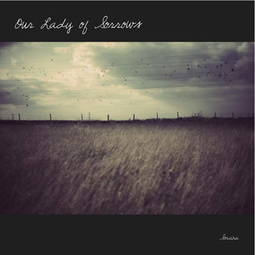|
Sorana is a London-based musician who recently released an album called Our Lady of Sorrows, which revolves around an interesting concept. According to Sorana she “takes fourteen contemporary music pieces composed between 1940 and 1970 and makes a song based on each one of them, while at the same time expresses the different stories of solitude and isolation experienced by biblical women.” It’s an interesting concept and truly ends up working because of the music and vocal performances delivered by Sorana. Her prominent piano playing and her dynamic vocal abilities carry the majority of the album but the jazz style almost Portishead-like drumming is nothing to scoff at either. This isn’t an album that feels light in any way. The songs are deep with meaning and emotion and spew with an overwhelming melancholy. Additionally, there are fifteen songs on this album that take a bit of time to seep into your soul. It’s a journey well worth taking but will take some time and effort from the listener. The album starts with a song that is a deviation from most of the other material. Sorana creates a swell of vocal harmonies that are drenched in reverb. It sounded like something you might hear from Julianna Barwick except Sorana sings as if she is in a trance at a Knight of Templar gathering. The second song “Sarah” is more indicative of the general style you will hear for the remainder of the album. Her vocals soar as you are treated to her passionate voice that can sound powerful, fragile, hurt and sad. “Mary” implements a field recording of what might be a playground by the ocean while a sparse piano melody play as she sings. It’s an enjoyable song but I felt the field recording was bit too prominent in the mix. It drowned out the music on occasion and I would have preferred to hear the music. “Sophia” is infused with multiple vocal harmonies that cascade throughout often blurring the lines as to if there is any lead vocal line. “Ruth” is a stripped back song relying on a single lead vocal and piano until the last 45 seconds in which drums enter the picture. I enjoyed the soulful almost Fionna Apple type vocal she implements on “Miriam” even though there was only two minutes of it. The only fault on this album is that a number of the pieces felt like skeletons or ideas that were never flushed out and felt disparate from the rest. For the most part the album works despite a couple of missteps. Overall, you will not want to miss Sorana’s voice as well as some of the well written songs on this album.
0 Comments
Your comment will be posted after it is approved.
Leave a Reply. |
Critique/insightWe are dedicated to informing the public about the different types of independent music that is available for your listening pleasure as well as giving the artist a professional critique from a seasoned music geek. We critique a wide variety of niche genres like experimental, IDM, electronic, ambient, shoegaze and much more.
Are you one of our faithful visitors who enjoys our website? Like us on Facebook
Archives
July 2024
|

